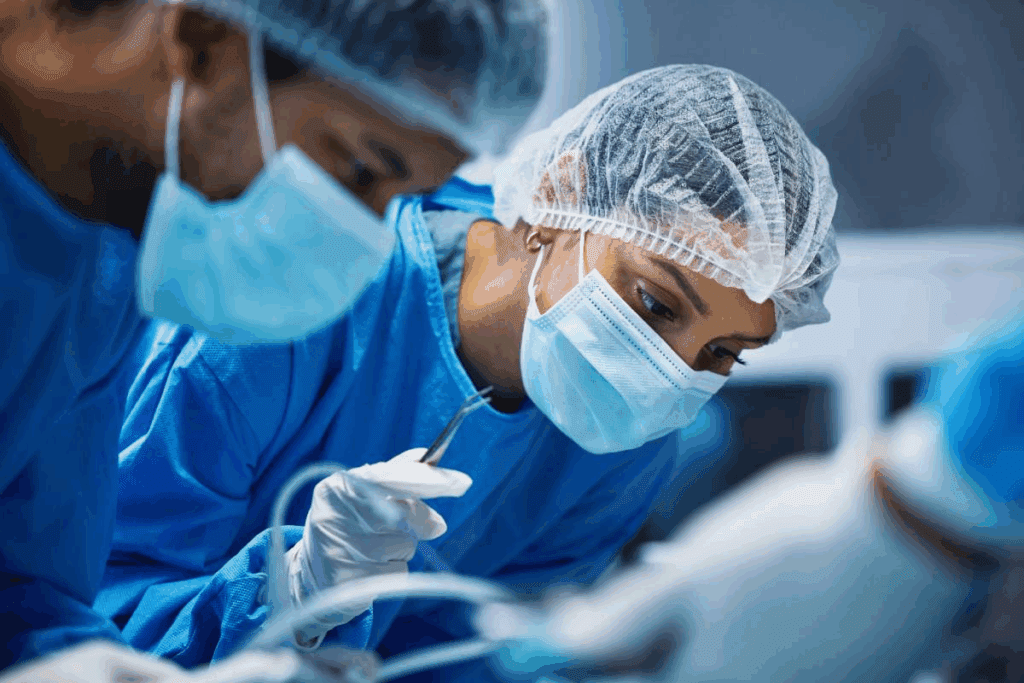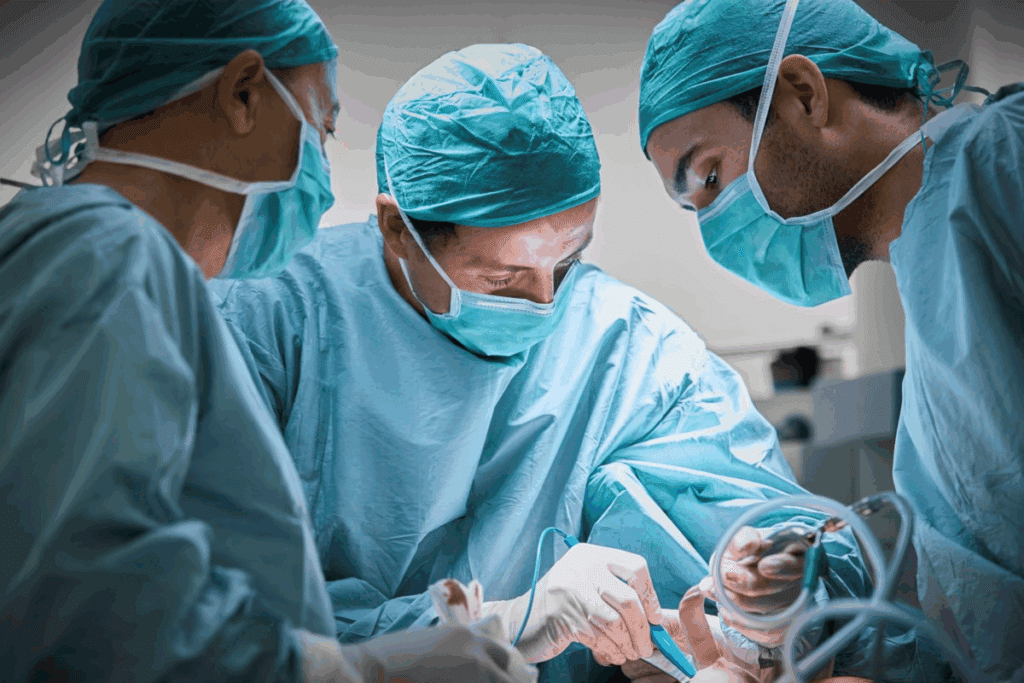Last Updated on November 26, 2025 by Bilal Hasdemir

Recovering from colon cancer surgery is a journey. It’s influenced by many factors. These include the surgical technique, the cancer’s stage, and the quality of care. Understand colon cancer surgery recovery time, tips, and what to expect after surgery.
At Liv Hospital, we focus on patient-centered care. Our care is internationally competitive. This ensures better outcomes and a smoother recovery for our patients. Our experienced surgeons use advanced laparoscopic and minimally invasive techniques. These help patients heal faster.
The recovery process has several stages. These include the hospital stay and immediate post-surgery recovery. Knowing these stages helps patients manage their recovery. It also reduces the risk of complications.

There are many surgeries for colon cancer, each affecting recovery differently. Knowing these differences helps patients prepare and recover better.
Colon resection is a common surgery for colon cancer. It removes the cancerous part of the colon and sews the healthy ends together. This surgery can be done in different ways.
Minimally invasive surgeries, like laparoscopic and robotic methods, are gaining popularity. They offer smaller cuts, less pain, and quicker healing.
The choice between minimally invasive and open surgery depends on several factors. These include the cancer’s stage and location, and the patient’s health. Minimally invasive surgeries usually mean shorter hospital stays and faster recovery.
Open surgery, with its larger incision, is needed for complex cases or hard-to-reach cancers. It may lead to a longer recovery, but it’s sometimes necessary for complete cancer removal.
The type of surgery greatly affects recovery time. Talking to a healthcare provider about the options helps patients understand what to expect during recovery.

The recovery after colon cancer surgery is complex. It depends on many patient and cancer-related factors. Knowing these can help patients and caregivers get ready for the journey ahead.
Age and overall health are key to how fast you recover. Younger and healthier patients usually get better faster.
Other important factors include:
| Patient Factor | Impact on Recovery |
| Age | Younger patients tend to recover faster |
| Overall Health | Patients in good health recover more quickly |
| Physical Fitness | Higher fitness levels correlate with faster recovery |
The stage and location of the cancer also matter a lot. For example, stage 1 colon cancer surgery recovery is usually quicker than later stages.
The type of surgery needed affects recovery, too. Smaller, less invasive surgeries often mean shorter recovery times than bigger surgeries.
| Cancer Factor | Impact on Recovery |
| Cancer Stage | Early-stage cancer recovery is generally faster |
| Cancer Location | Tumors in certain locations may require more complex surgery |
| Type of Surgery | Minimally invasive surgeries often have shorter recovery times |
Understanding these factors helps patients prepare for recovery. It also lets healthcare providers give more personalized support.
The time you spend in the hospital after colon cancer surgery depends on the type. People who have minimally invasive laparoscopic procedures usually stay less than those with open surgery.
Those who have minimally invasive laparoscopic surgery often stay 3-5 days. This is because laparoscopic surgery causes less damage and heals faster.
On the other hand, those with open surgery might stay 5-7 days. Open surgery needs a bigger cut and can cause more damage, leading to a longer recovery.
In the hospital, you get a lot of care, including:
We know the hospital stay is key to getting better. Our team works hard to give you the best care.
Knowing what to expect in the hospital helps you prepare for recovery. It helps you get the best results.
Knowing how long it takes to recover from colon cancer surgery is key. Most people start to feel better and can do normal things again in 2-3 months. This timeline helps manage expectations and ensures a smooth healing process.
The first week after surgery is very important. Patients often feel pain, tiredness, and changes in bowel habits.
It’s best to start with a liquid diet and slowly move to solid foods. Managing pain is also a top priority, with medicines to keep discomfort low.
In the short-term recovery, patients start to feel better. They can do light activities in 2-6 weeks. But they should avoid heavy lifting, bending, or hard work.
In the long-term recovery, patients keep getting better. By 2-3 months, they can usually go back to their usual activities, like work and exercise.
It’s vital to keep a healthy lifestyle. This includes eating well and staying active to help with long-term recovery and health.
The stage of colon cancer at diagnosis greatly affects recovery after surgery. We’ll look at how recovery changes from stage 1 to advanced stages. Early detection brings benefits, while advanced cancer poses challenges.
Patients with stage 1 colon cancer often have an easier and faster recovery. Early-stage colon cancer surgery recovery is less complicated, with fewer problems after surgery. This is because the cancer is in its early stages, and surgery is less invasive.
One big plus of early-stage recovery is avoiding a colostomy bag. In stage 1, the tumor is removed without needing to take out much of the colon or rectum. This keeps bowel function normal.
“Early detection of colon cancer significantly improves the chances of a successful surgery and recovery.”
Recovering fromann advanced-stage colon cancer is harder. Surgery for advanced stages is more complex, like removing a lot of the colon or rectum. This makes recovery longer and more difficult.
Advanced stages might need extra treatments like chemotherapy or radiation, along with surgery. These treatments can make recovery even harder and longer.
| Recovery Aspect | Stage 1 Colon Cancer | Advanced Stage Colon Cancer |
| Surgical Complexity | Less invasive | More complex and invasive |
| Colostomy Requirement | Less likely | More likely |
| Recovery Time | Generally shorter | Typically longer |
Knowing these differences is key to managing expectations and preparing for recovery. While stage 1 recovery is simpler, advanced stages need a team of healthcare professionals for a full recovery.
Not all patients with colon cancer need a colostomy after surgery. A colostomy is a surgery that makes an opening in the belly. This opening, called a stoma, lets waste go into a bag.
Having a colostomy can seem scary. But doctorsonly do it when it’s really needed. They look at the cancer and the patient’s health to decide.
Several things decide if a patient needs a colostomy. These include:
The tumor’s location is very important. Tumors in the lower colon might need a colostomy. This is because of their size or if they’ve spread.
A colostomy can be either short-term or long-term, depending on the situation.
Knowing if your colostomy is temporary or permanent is key. It helps you prepare for recovery and adjust to new bowel habits.
Understanding and managing complications is key to a smooth recovery after colon cancer surgery. Surgery is a big step in treating colon cancer, but it comes with risks. Knowing about these complications helps patients and caregivers act fast if needed.
After colon cancer surgery, several complications can happen. These include leaks, infections, blood clots, and bleeding. Leaks at the surgery site can cause severe infections and need quick medical help. Infections can also occur in the wound or inside the abdomen. Blood clots form from too much bed rest, and bleeding can happen during or after surgery.
To prevent these complications, moving around soon after surgery helps prevent blood clots. Antibiotics may be given to prevent infection. It’s also important to watch for signs of leaks or bleeding.
It’s vital to know the signs and symptoms of complications. Patients should get medical help right away if they have severe abdominal pain, fever, chills, or signs of infection at the surgical site. Vomiting, severe constipation, or trouble passing gas could mean a blockage or other issue. Any unusual or severe symptoms should be reported toldreportedthe healthcare provider right away.
We stress the importance of follow-up care and watching closely during recovery. By knowing about possible complications and taking steps to prevent them, patients can greatly improve their outcomes after colon cancer surgery.
Recovering from colon cancer surgery needs the right mix of nutrition and physical activity. It’s key to know how diet and exercise help in healing and building strength.
Patients should stick to a structured diet after surgery. Begin with clear liquids and slowly add solid foods as your body gets stronger.
Eating a balanced diet full of protein, vitamins, and minerals helps healing. Staying hydrated is also key; drink lots of fluids all day.
Start with gentle exercises after surgery and slowly increase the intensity. This helps regain strength, improves blood flow, and lowers complication risks.
Listen to your body and don’t overdo it. Regular physical activity can improve recovery and quality of life.
“A well-structured recovery plan that includes proper nutrition and physical activity can significantly improve outcomes after colon cancer surgery.”
By focusing on nutrition and physical activity, patients can improve their recovery. This leads to a healthier, more active life after surgery.
Knowing what to expect after colon cancer surgery is key for patients. We’ve covered many important topics. These include the types of surgeries, what affects recovery, and the need for follow-up care.
Most people can get back to their usual life in 2-3 months after surgery. But some changes might last forever, and ongoing care could be needed. The outcome after surgery depends on the cancer’s stage and how wellthe treatmentt works.
Recovering from colon cancer surgery is more than just healing right after. It also means ongoing care to watch for cancer coming back and manage the long-term effects. By understanding this process, patients can better handle their recovery journey.
We stress the importance of ongoing care for the best recovery from colon cancer. With the right care and support, patients can have a successful recovery. This improves their long-term outlook after surgery.
Recovery time after colon cancer surgery varies. It depends on the surgery type, cancer stage, and patient factors. Generally, it takes several weeks to a few months to recover.
Minimally invasive surgeries, like laparoscopic and robotic, use smaller cuts. They lead to quicker healing and shorter hospital stays. Open surgeries need bigger cuts and may take longer to recover.
Several factors affect the need for a colostomy bag after surgery. These include cancer location and stage, and the surgery type. Some patients may need a temporary or permanent colostomy.
Complications like infection, bowel obstruction, and adhesions can happen. Knowing the signs helps patients and caregivers get medical help quickly if needed.
Eat a balanced diet rich in nutrients after surgery. Stay hydrated and avoid foods that cause discomfort or complications.
Stage 1 colon cancer surgery recovery is usually quicker. Patients can expect to recover in a few weeks to months.
Physical activity is key to recovery. It boosts well-being and supports healing. Follow a safe exercise plan to avoid complications and improve recovery.
The cancer stage greatly affects recovery. Early-stage cancer patients often have better outcomes and fewer complications than those with advanced stages.
In the hospital, you’ll get close monitoring and care. This includes managing pain, preventing complications, and supporting nutrition. The stay length varies based on surgery type and patient factors.
Early-stage surgery recovery has many benefits. It includes shorter hospital stays, faster recovery, and fewer complications. Patients with early-stage cancer tend to have better outcomes and quality of life.
Recovery with a colostomy involves adjusting to the bag and its care. Recovery time varies based on individual factors and surgery type.
Look out for fever, abdominal pain, vomiting, and bleeding. If you or your caregiver notices these symptoms, seek medical help right away.
Subscribe to our e-newsletter to stay informed about the latest innovations in the world of health and exclusive offers!